
List of Hatha yoga postures
Encyclopedia
This is a list of some common Yoga postures, or asanas. Different names may be given to postures, depending on the school, the origin of the system within that school, or the yogi
or guru
who developed the system in question. A case in point would be Hanumanasana
, the supported version of which is typically called "Runner's Stretch" by Kripalu practitioners. Also, a "Flat Back Forward Bend" in the Shivananda
system is referred to as "Preparation for Chair" in both Ashtanga Vinyasa Yoga
and Bikram Yoga
.
are repeatedly used in the names of asanas. Generally these are prefixes and can be used on any pose to explain a variation.
Yogi
A Yogi is a practitioner of Yoga. The word is also used to refer to ascetic practitioners of meditation in a number of South Asian Religions including Jainism, Buddhism, and Hinduism.-Etymology:...
or guru
Guru
A guru is one who is regarded as having great knowledge, wisdom, and authority in a certain area, and who uses it to guide others . Other forms of manifestation of this principle can include parents, school teachers, non-human objects and even one's own intellectual discipline, if the...
who developed the system in question. A case in point would be Hanumanasana
Hanumanasana
Hanumanasana, or Monkey Pose is an asana.- Etymology :The name comes from the Sanskrit words Hanuman and asana , and commemorates the giant leap made by Hanuman to reach the Lankan islands from the mainland of India.- Description :The yogi pushes one leg forward and one leg backwards until they...
, the supported version of which is typically called "Runner's Stretch" by Kripalu practitioners. Also, a "Flat Back Forward Bend" in the Shivananda
Shivananda
Swami Shivananda was born Tarak Nath Ghosal in the village of Barasat in West Bengal. He was a direct disciple of Sri Ramakrishna, and became the second president of the Ramakrishna Mission. His devotees refer to him as Mahapurush Maharaj . Swami Shivananda and Swami Subodhananda were the only...
system is referred to as "Preparation for Chair" in both Ashtanga Vinyasa Yoga
Ashtanga Vinyasa Yoga
Ashtanga Vinyasa Yoga or Ashtanga Yoga is a system of yoga popularized by K. Pattabhi Jois, and which is often promoted as a modern-day form of classical Indian yoga...
and Bikram Yoga
Bikram Yoga
Bikram Yoga is a system of yoga that Bikram Choudhury synthesized from traditional hatha yoga techniques and popularized beginning in the early 1970s. Bikram's classes run exactly 90 minutes and consist of a set series of 26 postures and 2 breathing exercises...
.
| Sanskrit Sanskrit Sanskrit , is a historical Indo-Aryan language and the primary liturgical language of Hinduism, Jainism and Buddhism.Buddhism: besides Pali, see Buddhist Hybrid Sanskrit Today, it is listed as one of the 22 scheduled languages of India and is an official language of the state of Uttarakhand... transliteration Transliteration Transliteration is a subset of the science of hermeneutics. It is a form of translation, and is the practice of converting a text from one script into another... |
Sanskrit | English | Image | Notes |
|---|---|---|---|---|
| Adho Mukha Śvānāsana Adho Mukha Svanasana thumb|right|Downward-Facing DogAdho Mukha Svanasana, Adho Mukha Shvanasana , Downward-Facing Dog Pose, Downward Dog, or Down Dog, is an asana.- Etymology :... |
अधोमुखश्वानासन | Downward-Facing Dog Pose |  |
|
| Adho Mukha Vṛkṣāsana | अधोमुखवृक्षासन | Handstand (Downward-Facing Tree) | 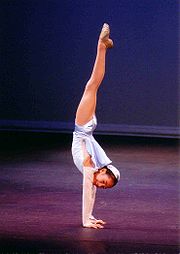 |
|
| Ākarṇa Dhanurāsana | आकर्णधनुरासन | Bow posture up to ear |  |
|
| Anantāsana Anantāsana Anantāsana , Vishnu's Couch Pose, Eternal One's Pose, or Side-Reclining Leg Lift, is an asana.- Etymology :The name comes from the Sanskrit words anantā meaning "without end" or "the infinite one", derived from the name of the thousand-headed serpent Sesa upon which Vishnu rested at the bottom of... |
अनन्तासन | Posture of Ananta Ananta Ananta is a Sanskrit word meaning "without end".It may refer to:*Ananta , one of the names of Vishnu.*Ananta , Actor and Producer for Bengali film.*Ananta, a serpent on which Vishnu lies, aka Shesha.... one of the names of Vishnu Vishnu Vishnu is the Supreme god in the Vaishnavite tradition of Hinduism. Smarta followers of Adi Shankara, among others, venerate Vishnu as one of the five primary forms of God.... |
||
| Añjali Mudrā Añjali Mudrā Añjali Mudrā or Pranamasana is a hand gesture which is practiced throughout Asia. It is used as a sign of respect and a greeting in India and amongst yoga practitioners and adherents of similar traditions... |
अञ्जलिमुद्रा | Salutation hand posture | 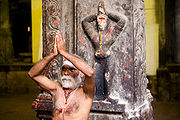 |
|
| Ardha Candrāsana Ardha Candrāsana Ardha Candrāsana or Half Moon Pose is an asana.- Etymology :The name comes from the Sanskrit words Ardha meaning "half", Candra or Chandra meaning "moon" or "luminous, as in the light from the moon", and Asana meaning "posture" or "seat".- Benefits :The moon is symbolic in yoga mythology... |
अर्धचन्द्रासन | Half Moon | ||
| Ardha Matsyendrāsana Ardha Matsyendrāsana Ardha Matsyendrāsana , Half Lord of the Fishes Pose, or Half Spinal Twist Pose, is an asana.- Etymology :The pose is named after the great yogi, Matsyendranath, who according to some texts is considered a founding father of modern yoga practices.The name comes from the Sanskrit words ardha meaning... |
अर्धमत्स्येन्द्रासन | Half Spinal Twist | ||
| Ardha Navāsana Ardha Navāsana Ardha Navāsana or Half Boat Pose is an asana. It is a variation of Paripūrṇa Nāvāsana.- Etymology :The name comes from the Sanskrit words ardha meaning "half", nava meaning "boat" and asana meaning "posture" or "seat".... |
अर्धनावासन | Half boat posture | ||
| Baddha Koṇāsana Baddha Koṇāsana Baddha Konasana , Bound Angle Pose, or Cobbler Pose , is an asana.- Etymology :... |
बद्धकोणसन | Bound Angle | ||
| Bakāsana Bakasana Bakasana or Crane Pose is an asana. Bakasana has been translated into English as Crow Pose and often used interchangeably with Kakasana depending on the lineage of the yoga being practiced.- Etymology :... |
बकासन | Crane | ||
| Bālāsana Balasana Balasana , Child's Pose, or Child's Resting Pose, is an asana.- Etymology :The name comes from the Sanskrit words bala meaning "child" and asana meaning "posture" or "seat".- Description :... |
बालासन | Child's Pose |  |
|
| Garbhāsana | गर्भासन | |||
| Bhekāsana | भेकासन | Frog | ||
| Bharadvājāsana | भरद्वाजासन | Bharadvaja's Twist | ||
| Bhujaṅgāsana Bhujangasana -Etymology:The name comes from the Sanskrit words bhujanga meaning "snake" or "serpent" and asana meaning "posture" or "seat".-Benefits:... |
भुजङ्गासन | Cobra |  |
|
| Bhujapīḍāsana | भुजपीडासन | Arm-pressing posture | ||
| Chakrāsana Chakrasana Chakrasana or Wheel Pose is a yoga asana. It is part of the finishing sequence of the Primary Series of Ashtanga Yoga and is a backwards somersault into Chaturanga Dandasana-Etymology:... |
चक्रासन | Wheel | ||
| Caturaṅga Daṇḍāsana | चतुरङ्गदण्डासन | Four-Limbed Staff | ||
| Daṇḍāsana Daṇḍāsana -Etymology:The name comes from the Sanskrit words Danda meaning "stick", and Asana meaning "posture" or "seat".-Description:The foundation of all seated yoga asanas - forward bends and twists.... |
दण्डासन | Staff pose | ||
| Dhanurāsana Dhanurasana Dhanurasana , Bow Pose, or sometimes Urdva Chakrasana , is an asana.- Etymology :... |
धनुरासन | Bow |  |
|
| Dwi pada sirsasana | Both feet behind head | |||
| Dvi Pāda Viparīta Daṇḍāsana Dwi Pada Viparita Dandasana Dwi Pada Viparita Dandasana or Two-Legged Inverted Staff Pose is a yoga asana and is a combination of Sirsasana and Urdhva Dhanurasana .- Etymology :... |
द्विपदविपरितदन्दसन | Two-Legged Inverted Staff Pose | ||
| Eka Pāda Rājakapotāsana | एकपादरजकपोतसन | One-Legged King Pigeon | ||
| Ekapādaśīrṣāsana | एकपादशीर्षासन | Head stand one foot | ||
| Head stand by only holding) one foot | ||||
| Ekapādaprasāraṇa-sarvāṅgatulāsana | एकपादप्रसारणसर्वाङ्गतुलासन | Balance posture for the whole body, by extending one leg | ||
| Eka Pada Sirsasana | Foot behind Head | |||
| Garbhāsana Garbhāsana Garbhāsana , Embryo Pose, Foetus Pose, or Fetus Pose is an asana.- Etymology :The name comes from the Sanskrit words garbha meaning "embryo" or "fetus" and asana meaning "posture" or "seat".- Benefits :... |
गर्भासन | Fetus | ||
| Garuḍāsana Garuḍāsana - Etymology :The name comes from the Sanskrit words garuda meaning "eagle", and asana meaning "posture" or "seat".In Hindu mythology Garuda is known as the king of birds. He transports the God Vishnu and is eager to help humanity fight against demons... |
गरुडासन | Eagle | ||
| Gomukhāsana Gomukhāsana Gomukhasana or Cow Face Pose is an asana.-Etymology:The name comes from the Sanskrit words Go meaning "cow", Mukha meaning "head" or "mouth", and Asana meaning "posture" or "seat".... |
गोमुखासन | Cow Face | ||
| Halāsana Halasana -Etymology:The name comes from the Sanskrit words hala meaning "plow" and asana meaning "posture" or "seat".-Description:The practitioner lies on the floor, lifts the legs, and then places them behind the head.-Cautions:... |
हलासन | Plough Plough The plough or plow is a tool used in farming for initial cultivation of soil in preparation for sowing seed or planting. It has been a basic instrument for most of recorded history, and represents one of the major advances in agriculture... |
 |
|
| Hanumanāsana Hanumanasana Hanumanasana, or Monkey Pose is an asana.- Etymology :The name comes from the Sanskrit words Hanuman and asana , and commemorates the giant leap made by Hanuman to reach the Lankan islands from the mainland of India.- Description :The yogi pushes one leg forward and one leg backwards until they... |
हनुमनासन | Named after Hanuman Hanuman Hanuman , is a Hindu deity, who is an ardent devotee of Rama, a central character in the Indian epic Ramayana and one of the dearest devotees of lord Rama. A general among the vanaras, an ape-like race of forest-dwellers, Hanuman is an incarnation of the divine and a disciple of Lord Rama in the... |
||
| Jaṭharaparivartanāsana | जठरपरिवर्तनासन | Belly-revolving posture | ||
| Jānuśīrṣāsana Jānuśīrṣāsana Janu Sirsasana , Head-to-Knee Pose, Head-to-Knee Forward Bend, Head of the Knee Pose, or Head-on-Knee Pose is a yoga asana... |
जानुशीर्षासन | Head-to-Knee Forward Bend | ||
| Kākāsana Kākāsana Kakasana or Crow Pose is an asana.In many instances, Crow Pose is used interchangeably with Crane Pose as both are poses where the hands are planted on the floor, the shins rest upon the upper arms, and the feet lift up... |
काकासन | Crow | ||
| Kapotāsana Kapotāsana - Etymology :The name comes from the Sanskrit words kapota meaning "pigeon" and asana meaning "posture" or "seat".- Description :It involves bending backward, a posture which helps to open up the chest and also strengthens the back and groin... |
कपोतासन | Pigeon | ||
| Karṇapīḍāsana | कपोतासन | Ear-pressing | ||
| Krāuñcāsana | क्रौञ्चासन | Heron | ||
| Kukkuṭāsana Kukkuṭāsana - Etymology :The name comes from the Sanskrit words kukkuṭā meaning "cock" and asana meaning "posture" or "seat".- Benefits :Kukkuṭāsana posture helps in the strengthening of the joints as the wrists, elbows and shoulders; helps in the improvement of the digestive system; increases the balance in... |
कुक्कुटासन | Cockerel | ||
| Kūrmāsana Kūrmāsana -Etymology:The name comes from the Sanskrit words Kurma meaning "turtle" or "tortoise", which the posture resembles, and Asana meaning "posture" or "seat".-Description:thumb|right|Tortoise Pose... |
कूर्मासन | Tortoise | ||
| Lolāsana | लोलासन | Pendant | ||
| Mahāmudrā Mahamudra Mahāmudrā literally means "great seal" or "great symbol." It "is a multivalent term of great importance in later Indian Buddhism and Tibetan Buddhism" which "also occurs occasionally in Hindu and East Asian Buddhist esotericism."The name refers to the way one who... |
महामुद्रा | Great hand posture | ||
| Makarāsana Makarāsana - Etymology :The name comes from the Sanskrit words makara meaning "crocodile" and asana meaning "posture" or "seat".- Description :It is a relaxation pose, a supine version of Savasana, often adopted to relax the body after a strenuous pose.... |
मकरासन | Crocodile | ||
| Muktahastaśīrṣāsana | मुक्तहस्तशीर्षासन | Head stand | ||
| Maṇḍalāsana | मण्डलासन | Circle | ||
| Matsyāsana Matsyasana Matsyasana or Fish Pose is an asana.It is commonly considered a counter-pose to Sarvangasana, or shoulder stand, specifically within the context of the Ashtanga Vinyasa Yoga Primary Series.-Etymology:... |
मत्स्यासन | Fish | ||
| Matsyendrāsana | मत्स्येन्द्रासन | Lord of the Fishes | ||
| Mayūrāsana Mayurasana Mayurasana or Peacock Pose is an asana.-Etymology:The name comes from the Sanskrit words mayura meaning "peacock" and asana meaning "posture" or "seat".-Description:... |
मयूरासन | Peacock | ||
| Naṭarājāsana Naṭarājāsana -Etymology:The name comes from the Sanskrit words nata meaning "dancer", raja meaning "king", and asana meaning "posture" or "seat". Nataraja is one of the names given to the Hindu God Shiva in his form as the cosmic dancer.-Description:... |
नटराजासन | Lord of the Dance or Dancer | ||
| Nirālambasarvāṅgāsana | निरालम्बसर्वाङ्गासन | Posture for the whole body | ||
| Pādahastāsana Pādahastāsana -Etymology:The name comes from the Sanskrit words pada meaning "foot", hasta meaning "hand", and asana meaning "posture" or "seat".-Description:... |
पादहस्तासन | Standing Forward Bend | ||
| Padmāsana | पद्मासन | Lotus | 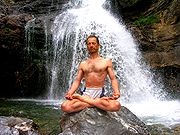 |
|
| Paripūrṇanāvāsana | परिपूर्णनावासन | Full Boat | ||
| Parivṛttapārśvakoṇāsana | परिवृत्तपार्श्वकोणासन | Revolved Side Angle | ||
| Parivṛttatrikoṇāsana | परिवृत्तत्रिकोणासन | Revolved Triangle | ||
| Paryaṅkāsana | पर्यङ्कासन | Bed | ||
| Pāśāsana Pāśāsana Pasasana or Noose Pose is an asana.-Etymology:The name comes from the Sanskrit words pasa meaning "noose" or "snare", and asana meaning "posture" or "seat".-Description:... |
पाशासन | Noose | ||
| Paścimottānāsana Paschimottanasana Paschimottanasana , Seated Forward Bend, or Intense Dorsal Stretch, is an asana.Together with Padmasana , Siddhasana and Vajrasana , this pose is an accomplished pose according to the Shiva Samhita... |
पश्चिमोत्तानासन | Seated Forward Bend |  |
|
| Paccimasana | ||||
| Paschima tana | ||||
| Prasāritapādottānāsana | प्रसारितपादोत्तानासन | Intense Spread Leg Stretch | ||
| Rājakapotāsana | राजकपोतासन | Royal pigeon | ||
| Śalabhāsana Salabhasana Salabhasana, Shalabhasana , Locust Pose, or Grasshopper Pose. is an asana.-Description:It is a form of back bend, or spine stretch, using the strength of the upper and middle back to lift the weight of the legs as high as possible from a starting position face down on the floor. Most people find... |
शलभासन | Locust | ||
| Grass-hopper | ||||
| Samakoṇāsana | समकोणासन | Straight angle | ||
| Sarvāṅgāsana Sarvangasana Sarvangasana or Shoulderstand is an āsana.Many variations of the Shoulderstand exist, the likely most common to be taught is Supported Shoulderstand .Sarvangāsana is nicknamed "queen" or "mother" of all the yoga poses.... |
सर्वाङ्गासन | Shoulder Stand | 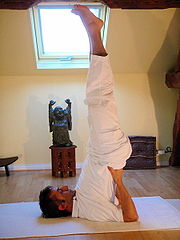 |
|
| Śavāsana Savasana -Etymology:The name comes from the Sanskrit words Shava meaning "corpse", and Asana meaning "posture" or "seat".-Description:... |
शवासन | Corpse Pose |  |
|
| Shavasana | ||||
| Sarvasana | ||||
| Mrtasana | ||||
| Setubandhasarvāṅgāsana | सेतुबन्धसर्वाङ्गासन | Bridge | ||
| Sethubandasana | सेतुबन्धसन | Half Wheel | ||
| Siddhāsana Siddhasana Siddhasana or Accomplished Pose is a Yoga asana.-Etymology:The name comes from the Sanskrit words siddha meaning both "perfect" and "adept", and asana meaning "posture" or "seat".-Description:... |
सिद्धासन | Perfect Pose | ||
| Muk-tasana | मुक्तसन | |||
| Guptasana | गुप्तसन | |||
| Siṁhāsana Simhasana Simhasana is a Hatha Yoga asana known in English as Lion Pose.-Etymology:The name comes from the Sanskrit words simha meaning "lion", and asana meaning "posture" or "seat".-Description:... |
सिंहासन | Lion | ||
| Śīrṣāsana Sirsasana Sirsasana, Shirshasana, Sirshasana , or Headstand, is an asana.In the Supported Headstand , the body is completely inverted, and held upright supported by the forearms, while the crown of the head rests lightly on the floor.Sirsasana is nicknamed "king" of all the yoga poses.-Etymology:The name... |
शीर्षासन | Head Stand |  |
|
| Sukhāsana Sukhasana Sukhasana , Easy Pose, Decent Pose, or Pleasant Pose, is an asana practised in yoga, buddhism and hinduism, similar to sitting in a simple cross-legged position. While opening the hips and lengthening the spine, the posture's relative ease on the knees makes it easier than siddhasana or padmasana... |
सुखासन | Auspicious Pose |  |
|
| Suptabaddhakoṇāsana | सुप्तभदकोणासन | Reclining Bound Angle | ||
| Suptakoṇāsana | सुप्तकोणासन | Angle | ||
| Suptapādāṅguṣṭhāsana | सुप्तपादाङ्गुष्ठासन | Reclining Big Toe | ||
| Suptavīrāsana Supta Virasana -Etymology:The name comes from the Sanskrit words supta meaning "reclined", and asana meaning "posture" or "seat".-Description:... |
सुप्तवीरासन | Reclining Hero | ||
| Suptavajrāsana | सुप्तवज्रासन | Thunderbolt | ||
| Svastikāsana | स्वस्तिकासन | Prosperous Pose | ||
| Tāḍāsana Tadasana - Etymology :The name comes from the Sanskrit words tada meaning "mountain" and asana meaning "posture" or "seat".- Description :It is a very basic standing posture with feet together and hands at the sides of the body. Yoga practitioners consider it a pose that promotes confidence and happiness... |
ताडासन | Mountain Pose | ||
| Samasthiti | ||||
| Tiṭṭibhāsana | टिट्टिभासन | Firefly Pose | ||
| Trikoṇāsana Trikonasana Trikonasana or triangle pose is an asana. Variations include utthita trikonasana and parivrtta trikonasana .-Etymology:... |
त्रिकोणासन | Triangle | ||
| Tulāsana Tulāsana Tulāsana or Balance Pose is a yoga asana. It is also known as Dolasana , Tolasana , and Utthita Padmasana .-Etymology:... |
तुलासन | Balance posture | ||
| Uḍḍīyānabandha | उड्डीयानबन्ध | The abdominal lock | ||
| Upaviṣṭakoṇāsana | उपविष्टकोणासन | Open Angle | ||
| Ūrdhvadhanurāsana Urdhva Dhanurasana thumb|Urdvah DhanurasanaUrdvah Dhanurasana or Upward-Facing Bow Pose is a yoga asana, and is the upward facing form of Dhanurasana .-Description:... |
ऊर्ध्वधनुरासन | Upward Bow |  |
|
| Backbend | ||||
| Ūrdhvamukhaśvānāsana | ऊर्ध्वमुखश्वानासन | Upward-Facing Dog | ||
| Ūrdhvadaṇḍāsana | ऊर्ध्वदण्डासन | Stick | ||
| Uṣṭhāsana Ustrasana - Etymology :The name comes from the Sanskrit words Ushtra meaning "camel", and Asana meaning "posture" or "seat".- Description :It is a very deep backward bend performed in a kneeling position... |
उष्ठासन | Camel | 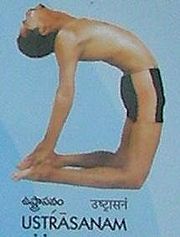 |
|
| Uttanakūrmāsana | उत्तानकूर्मासन | Upside-Down Tortoise | ||
| Utkaṭāsana Utkaṭāsana Utkatasana , Chair Pose, Fierce Pose, Hazardous Pose, Lightning Bolt Pose, Wild Pose, or, in Bikram Yoga, Awkward Pose, is a asana.-Etymology:... |
उत्कटासन | Chair | ||
| Uttānāsana Uttanasana Uttanasana|thumb|113pxUttanasana, variation|thumb|113pxUttanasana , Intense Forward-Bending Pose, Intense Strech Pose, Standing Forward Bend, Standing Forward Fold Pose, or Standing Head to Knees Pose, is an asana.-Etymology:... |
उत्तानासन | Standing Forward Bend |  |
|
| Utthitahastapādāṅguṣṭhāsana | उत्थितहस्तपादाङ्गुष्ठासन | Raised Hand to Big Toe | ||
| Utthitapārśvakoṇāsana | उत्थितपार्श्वकोणासन | Extended Side Angle | ||
| Utthitatrikoṇāsana | उत्थितत्रिकोणासन | Extended Triangle | ||
| Vasiṣṭhāsana | वसिष्ठासन | Side Plank | ||
| Vātāyanāsana | वातायनासन | Horse | ||
| Viparītakaraṇi Viparita Karani -Etymology:The name comes from the Sanskrit words viparita meaning "inverted" or "reversed", and karani meaning "doing" or "making" and asana meaning "posture" or "seat".... |
विपरीतकरणि | Legs-up-the-Wall | ||
| Vajrāsana Vajrasana Vajrasana , adamantine pose, diamond pose, kneeling pose, pelvic pose, and thunderbolt pose is an asana.- Etymology :... |
वज्रासन | Thunderbolt |  |
|
| Vīrāsana Vīrāsana -Etymology:The name comes from the Sanskrit words vira meaning "man" or "hero" or "chief", and asana meaning "posture" or "seat".-Description:... |
वीरासन | Hero | ||
| Vīrabhadrāsana | वीरभद्रासन | Distinguished hero | ||
| Vīrabhadrāsana II | वीरभद्रासन II | Warrior II | ||
| Vṛkṣāsana Vrksasana Vriksasana or tree pose is a asana.- Etymology :The name comes from the Sanskrit words vriksa or vriksha meaning "tree", and asana meaning "posture" or "seat".- Description :... |
वृक्षासन | Corn Tree | 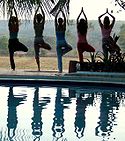 |
|
| Vṛścikāsana | वृश्चिकासन | scorpion |
Sanskrit terms
Some terms in SanskritSanskrit
Sanskrit , is a historical Indo-Aryan language and the primary liturgical language of Hinduism, Jainism and Buddhism.Buddhism: besides Pali, see Buddhist Hybrid Sanskrit Today, it is listed as one of the 22 scheduled languages of India and is an official language of the state of Uttarakhand...
are repeatedly used in the names of asanas. Generally these are prefixes and can be used on any pose to explain a variation.
| English | Sanskrit | Meaning |
|---|---|---|
| Adho | अधो | downward |
| Ardha | अर्ध | half |
| Eka | एक | one |
| single | ||
| Dhánus | Bow | |
| Parivṛtta | परिवृत्त | revolved |
| twisted | ||
| Supta | सुप्त | supine |
| reclining | ||
| tulā | तुला | balance |
| Ūrdhva | ऊर्ध्व | upward |
| Upaviṣṭha | उपविष्ट | seated |
| Utthita | उत्थित | extended |

